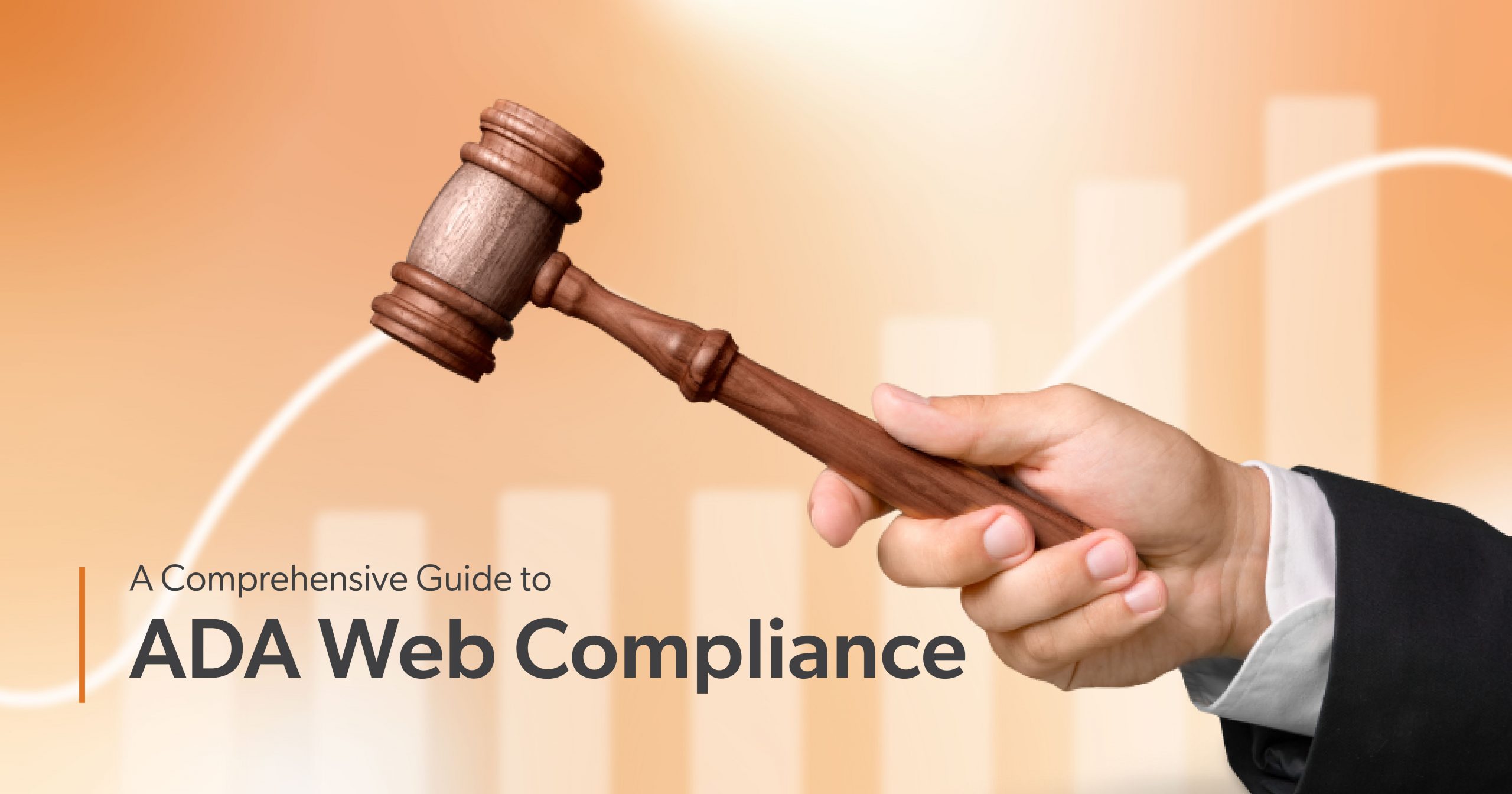As a website owner, you’ve likely heard about web accessibility and the implications of the Americans with Disabilities Act (ADA) on your digital space. Web accessibility is an integral part of the digital world, aiming to ensure that everyone, including individuals with disabilities, can access and use web content effectively.
In recent years, there has been a surge in ADA web compliance lawsuits that could impact your website and business. One key issue is the debate over whether ADA web accessibility “testers” have the legal standing to sue. This article aims to elucidate this complex issue and help you understand how it may affect your business.
The Americans with Disabilities Act and Web Accessibility
The Americans with Disabilities Act (ADA), signed into law in 1990, prohibits discrimination against individuals with disabilities in all areas of public life. However, it was initially unclear whether this act extended to websites, as they were less prevalent when the act was passed.
With the advent of the digital era, courts have gradually expanded the ADA’s scope to include websites, considering them as ‘places of public accommodation.’ This interpretation implies that websites should be accessible to individuals with disabilities, including those who have visual, auditory, or motor impairments.
In 2022, the Department of Justice (DOJ) published guidance confirming that the ADA applies to business websites. Non-compliance could expose your business to the risk of legal action, including lawsuits and fines.
The Rise of ADA Web Compliance Lawsuits
Recently, lawsuits related to ADA web compliance have become increasingly common. Many businesses, both small and large, have faced legal challenges due to the lack of accessibility of their websites. In 2023 alone, federal and state courts dealt with 4,605 lawsuits related to web accessibility.
These lawsuits argue that inaccessible websites create a discriminatory environment, depriving people with disabilities of the same opportunities afforded to those without. While many of these lawsuits are initiated by individuals with disabilities, a new group known as “testers” has emerged as a significant force.
Learn more about What You Need to Know About ADA Web Accessibility Lawsuits.
What is an ADA Web Accessibility “Tester”?
An ADA web accessibility “tester” is an individual who checks websites for ADA compliance. Their primary goal is to identify ADA violations, not necessarily to use the services or products provided on the website.
These individuals, sometimes people with disabilities themselves or professionals in accessibility consulting, are equipped with the knowledge and tools to test whether a website complies with established accessibility standards, such as the Web Content Accessibility Guidelines (WCAG).
If the tester deems the website inaccessible, they may file a lawsuit against the business. Some view this role as essential for holding companies accountable, while others see it as an opportunity for lawsuit abuse and exploitation.
What Gives Someone Ground to Sue?
Under the United States Constitution, a party must have standing to sue. ‘Standing’ is a legal term that refers to a person’s ability to demonstrate a sufficient connection to and harm from the law or action being challenged, supporting that person’s participation in the case. This requirement implies the person must allege that they attempted to access the business but were unable to or were interested in doing so but could not due to the website’s non-compliance.
In ADA lawsuits, the person suing must show that they experienced discrimination due to the website’s non-compliance. The question of standing has been a significant point of contention, especially when it comes to testers.
Can someone who has no intention of using your services or buying your products sue you because your website is not accessible?
This question brings us to a landmark case in ADA web accessibility lawsuits – Acheson Hotels, LLC v. Deborah Laufer.
Acheson Hotels, LLC v. Deborah Laufer
In late March, the case of Acheson Hotels, LLC v. Deborah Laufer became a focal point in the discussion surrounding the ADA web accessibility testers’ right to sue.
Plaintiff Deborah Laufer, a self-proclaimed “tester,” has filed over 600 lawsuits alleging ADA web accessibility violations since 2018, primarily targeting the hospitality industry.
The lower courts initially dismissed Laufer’s case against Acheson Hotels, arguing that Laufer did not intend to visit the hotel and, therefore, had not suffered any injury. However, Laufer appealed the decision, asserting that she was indeed affected by being unable to access information on the hotel’s website due to her disability. Despite acknowledging her role as a tester, Laufer argues that her motive is irrelevant.
In their brief in opposition, Laufer’s counsel referred to the text of the ADA, writing, “[…] One can readily find that a disabled person’s encounter with violations of the ADA is a real-world harm by reviewing the plain language in the findings and purposes set forth by Congress.”
The First Circuit Court of Appeals agreed and reversed the initial decision, asserting that Laufer had standing.
Supreme Court Case Takes Unexpected Turn
On March 27, 2023, the Supreme Court agreed to hear a case, but the matter took an unexpected twist. Laufer’s attorney was suspended from practicing law for defrauding hotels by lying in fee petitions and during settlement negotiations. Consequently, Laufer voluntarily dropped her lawsuit, rendering it moot. In a unanimous decision, the Supreme Court agreed.
A lawsuit can become moot when its central conflict has been resolved, as was when Laufer withdrew her claim. While the Supreme Court frequently addresses issues of standing, the Court can still address issues of mootness and the cases standing in any order it chooses.
While this particular lawsuit was declared moot, the split among the circuits regarding tester standing is still “very much alive,” and it is open to ruling on this issue in future cases.
The Future of Web Accessibility
216digital is not a law firm; we cannot provide legal advice. However, as experts in web accessibility, we understand that significant Supreme Court cases often influence the accessibility landscape. Although the Court’s ruling in Acheson Hotels, LLC v. Laufer does not alter the law, it signals the Court’s willingness to address concerns regarding the legal standing of ADA testers.
This stance may dissuade some ADA testers from initiating lawsuits, particularly against well-defended, high-profile defendants. Yet, as we’ve emphasized in previous articles, the prevalence of serious accessibility barriers is not few and far between.
With the uptick in web accessibility lawsuits each year, prioritizing web accessibility has never been more crucial. To minimize potential legal risks, online businesses must monitor their website’s accessibility and collaborate with accessibility experts to adhere to the WCAG standards.
Steps Businesses Should Take to Ensure ADA Compliance
Considering current affairs, it’s crucial that businesses ensure their websites are ADA-compliant. Here are some steps to take:
- Audit Your Website: Conduct a thorough website audit using ADA compliance tools or hire a professional.
- Follow WCAG Guidelines: The Web Content Accessibility Guidelines are reliable recommendations for making your website accessible. Aim for WCAG 2.1 Level AA compliance, which covers a broad range of recommendations for making web content more accessible.
- Regularly Update Your Website: Web accessibility is not a one-time task. Regularly review and update your website to ensure ongoing compliance as guidelines and technologies evolve.
- Train Your Team: Ensure your team understands the importance of ADA compliance. Provide them with training on maintaining accessibility during website updates and content creation.
- Regular Monitoring: Regularly monitor your website to ensure ongoing compliance.
- Consult with an Expert: If in doubt, consult with a web accessibility expert or lawyer specializing in ADA compliance to fully understand your legal obligations and ensure you’re doing everything necessary to comply.
Learn more about Mitigating ADA Lawsuit Risk: Affordable Solutions for Online Business.
Protect Your Online Business
ADA and web accessibility are crucial considerations for all website owners. The debate over whether ADA web accessibility “testers” can sue carries potentially significant implications. Regardless of the outcome, businesses need to strive towards full ADA compliance to avoid lawsuits and ensure a better, more inclusive user experience for all.
Find out if your website is ADA compliant today by scheduling a 15-minute complimentary website audit and consultation with our experts at 216digital. We can help determine if your website is at risk of a lawsuit and offer fast, effective ADA compliance solutions. This ensures your site is accessible to everyone, reducing your risk of litigation so you can continue focusing on what matters most: running your business.










